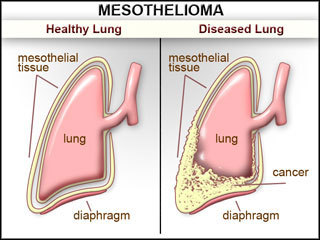Mesothelioma Causes, Symptoms, Diagnosis and Treatment

What Is Mesothelioma?
Mesothelioma, also called malignant mesothelioma, is a rare form of cancer that develops from cells of the mesothelium, the protective lining that covers many of the internal organs of the body. Mesothelioma is most commonly caused by exposure to asbestos
There are two main types of mesothelioma:
- pleural mesothelioma – the most common type, which develops in the tissue covering the lungs
- peritoneal mesothelioma – which develops in the lining of the tummy (abdomen)
Most people who develop mesothelioma have worked in careers such as mining, where they inhaled or ingested asbestos fibers, or were exposed to airborne asbestos dust and fibers in other ways.
As pleural mesothelioma can cause complications, such as:
- Difficulty breathing
- Chest pain
- Difficulty swallowing
- Pain caused by pressure on the nerves and spinal cord
- Accumulation of fluid in the chest (pleural effusion), which can compress the lung nearby and make breathing difficult
Mesothelioma is divided into the following stages - Stage I mesothelioma is considered localized cancer, meaning it’s limited to one portion of the lining of the chest.
- Stage II mesothelioma may have spread beyond the lining of the chest to the diaphragm or to a lung.
- Stage III mesothelioma may have spread to other structures within the chest and may involve nearby lymph nodes.
- Stage IV mesothelioma is an advanced cancer that has spread more extensively within the chest.
Causes Of Mesothelioma:
In general, cancer begins when a series of genetic mutations occur within a cell, causing the cell to grow and multiply out of control.
It isn’t clear what causes the initial genetic mutations that lead to mesothelioma, though researchers have identified factors that may increase the risk.
Risk Factors Of Mesothelioma:
- Asbestos exposure
Personal history of asbestos exposure.
Living with someone who works with asbestos - A family history of mesothelioma.
- Genetic disposition
Symptoms Of Mesothelioma:
Symptoms of pleural mesothelioma can include:
- pain in the chest or lower back
- shortness of breath
- a high temperature (fever) of 38ºC (100.4ºF) and sweating, particularly at night
- a persistent cough
- unexplained weight loss
Symptoms of peritoneal mesothelioma can include:
- pain or swelling in the tummy (abdomen)
- feeling sick (nausea) or being sick (vomiting)
- loss of appetite
- unexplained weight loss
- diarrhea or constipation
In severe cases of the disease, the following signs and symptoms may be present:
- Blood clots in the veins, which may cause thrombophlebitis
- Disseminated intravascular coagulation, a disorder causing severe bleeding in many body organs
- Jaundice, or yellowing of the eyes and skin
- Low blood sugar level
- Pleural effusion
- Pulmonary emboli, or blood clots in the arteries of the lungs
- Severe ascites
Diagnosis Of Mesothelioma:
Diagnostic tests include:
- Imaging tests
X-ray
CT scan
MRI
Ultrasound - Biopsy
Fine-needle aspiration
Thoracoscopy.
Laparoscopy
Thoracotomy
Laparotomy
Treatment Of Mesothelioma:
The following treatment options are available:
- Surgery
- Chemotherapy
- Radiation
- Clinical trials
By : Natural Health News




